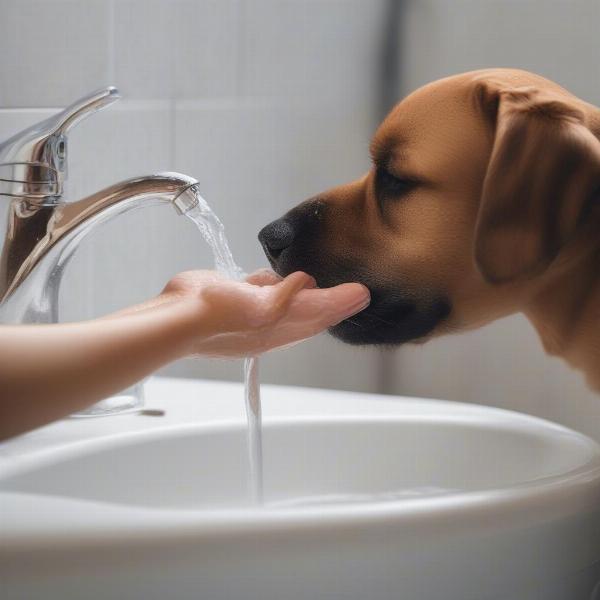After improperly licking a dog, you might be concerned about potential health risks. While the bond between humans and dogs is strong, and often involves physical affection like licking, it’s crucial to understand that a dog’s saliva can harbor bacteria and parasites that are harmful to humans. This article will address the potential health risks associated with dog licks, especially improper ones (like licking a wound or near your eyes/mouth), and what steps you should take to protect yourself.
Understanding the Risks of Dog Saliva
Dog saliva contains a complex mixture of bacteria, some of which are harmless and even beneficial to a dog’s oral health. However, dogs also carry bacteria that can cause infections in humans, especially if the saliva comes into contact with broken skin, mucous membranes (like your eyes, nose, or mouth), or if ingested. Some of the more common bacteria found in dog saliva include Pasteurella, Capnocytophaga, and Salmonella. These bacteria can lead to a variety of infections, ranging from mild skin irritation to more serious systemic illnesses. Parasitic infections are also a concern, with roundworms and hookworms being potential risks.
What Does “Improper Licking” Mean?
Improper licking refers to situations where dog saliva comes into contact with vulnerable areas on your body, increasing the risk of infection. This includes:
- Licking an open wound: Broken skin provides a direct entry point for bacteria and parasites.
- Licking near your eyes, nose, or mouth: These areas have mucous membranes that are easily penetrated by pathogens.
- Licking excessively: Even on intact skin, prolonged licking can cause irritation and increase the risk of infection.
- Licking after the dog has licked its own genitals or anus: This significantly increases the risk of transferring harmful bacteria.
What to Do After Improperly Licking a Dog
If a dog has licked you improperly, it’s important to take the following steps:
- Wash the area thoroughly: Immediately wash the affected area with soap and water for at least 20 seconds. This helps remove saliva and reduce the risk of infection.
- Disinfect the area (if applicable): If the lick involved an open wound, apply an antiseptic solution after washing.
- Observe the area: Monitor the area for any signs of infection, such as redness, swelling, pus, or pain.
- Seek medical attention if necessary: If you develop any symptoms of infection, consult a doctor immediately.
 Washing a wound after a dog lick
Washing a wound after a dog lick
Preventing Improper Licking
Preventing improper licking is the best way to protect yourself from potential health risks. Here’s how you can do it:
- Train your dog: Teach your dog basic commands like “leave it” and “no lick.” This will help you control their licking behavior.
- Manage interactions: Avoid letting your dog lick your face, especially near your eyes, nose, and mouth.
- Practice good hygiene: Wash your hands regularly after interacting with your dog.
- Regular veterinary checkups: Ensure your dog receives regular veterinary care, including vaccinations and parasite prevention.
What if My Dog Licked My Child?
Children are particularly vulnerable to infections from dog saliva due to their developing immune systems and tendency to put their hands in their mouths. If a dog licks a child improperly, take the same precautions as outlined above, paying extra attention to ensuring thorough cleaning and disinfection. Supervise interactions between children and dogs closely to minimize the risk of improper licking.
Conclusion
While dog licks can be a sign of affection, it’s essential to be aware of the potential health risks associated with improper licking. By understanding these risks and taking appropriate preventative measures, you can enjoy a healthy and loving relationship with your canine companion. After improperly licking a dog, always wash the affected area thoroughly and seek medical attention if you develop any signs of infection. Remember, a little precaution can go a long way in protecting your health.
FAQ
- Can I get sick from a dog licking my face? Yes, while not always, it’s possible to contract an infection from a dog licking your face, especially near your eyes, nose, and mouth.
- What are the symptoms of an infection from a dog lick? Symptoms can vary, but may include redness, swelling, pain, pus, fever, or flu-like symptoms.
- How can I prevent my dog from licking my face? Train your dog with commands like “leave it” and “no lick”, and manage interactions to avoid face licking.
- Are some people more at risk of infection from dog licks? Yes, young children, the elderly, and individuals with weakened immune systems are more vulnerable.
- Should I be concerned if my dog licks my wound? Yes, dog saliva can introduce bacteria into an open wound, increasing the risk of infection. Clean and disinfect the wound immediately.
- Is it safe to let my dog lick my hands? It’s best to avoid letting your dog lick your hands, especially before eating, and always wash your hands thoroughly after interacting with your dog.
- What should I do if my dog licks my eye? Flush your eye with clean water immediately and seek medical advice if you experience any irritation or vision changes.
ILM Dog is your go-to resource for expert advice on dog care, offering practical guidance on everything from breed selection and puppy care to senior dog health and training. Whether you’re a new dog owner or a seasoned expert, ILM Dog provides valuable insights and resources to help you navigate every stage of your dog’s life. From health and nutrition to behavior and training, we’re dedicated to helping you provide the best possible care for your furry friend. Contact us today for personalized support: [email protected] or +44 20-3965-8624.